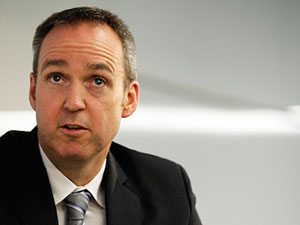
[miningmx.com] – BHP Billiton acknowledged a decision not to embark on a share buy-back programme was “a sore point” for certain shareholders, and may have resulted in hedge funds moving out of the stock.
Graham Kerr, CFO of BHP Billiton and the nominated CEO of a Newco the group will create from a proposed demerger, said handing shareholders pro-rata shares in the Newco may have also “irritated” those who are not mandated to hold investments in Australia. The Newco will have its primary listing in Perth and a secondary listing in Johannesburg.
BHP Billiton used its annual results yesterday (August 19) to confirm speculation it was demerging its aluminium, manganese, coal, nickel and silver assets so that it could focus on certain of its core assets such as iron ore and petroleum.
The full-year attributable profit came in 23% higher year-on-year to $13.8bn, but shares in the company sank back just over 5% on the day.
It missed a targeted reduction in net debt to $25bn by $800m – considered a key reason why it withheld a return to shareholders such as a special dividend or a buy-back of its own shares; nonetheless, analysts expressed their disappointment.
Macquarie Research said the positives of the unbundling of the group’s less competitive assets were “… understandably being overlooked “… given the absence of a buyback and the fact that UK shareholders will now receive Australian listed stock’.
Kerr agreed the share retraction did not indicate antipathy towards the Newco. “The stock was up 11% after first leak of news of Newco. So by the time we got to the results, the demerger was cooked into the numbers,” he said.
Shares in BHP Billiton were some 1.6% higher on the Johannesburg Stock Exchange today.
Commenting on the Newco, Kerr said it would have a strong shareholder base once it was established, expected to be the middle of 2015, and only after it had received regulatory approvals and passed a shareholder vote.
The company would take its place among the top 20 Australian companies which would oblige some investors there to hold the stock. It would also attract a relatively strong South African following. “South Africans also own 8% of BHP Billiton so the inward secondary listing will create a big base here [in South Africa],” he said.
He also alluded to growth potential within the company.
“It might be interested in going places where BHP might not by growing things in South Africa or Mozambique,” said Kerr.
Kerr defended the group’s aluminium business, which is situated in Richards Bay in South Africa’s KwaZulu-Natal province. The assets – the Hillside and the [now partially closed] Bayside smelters, have come in for some harsh criticism because BHP Billiton buys heavily discounted power from Eskom when the aluminium price is low.
The power contracts were signed more than 20 years ago when Eskom produced a surplus of electricity and the country, then in the grip of the apartheid regime, was in desperate need of new investment.
Kerr said the contracts were signed “in good faith” whilst South Africa’s current deficit of power might not be the status quo had the country built new capacity sooner than the December 2014 commissioning of Medupi’s first 800MW unit.
Said Kerr: “The aluminum story is not a dripping roast, margins are tight, but it [Hillside aluminium smelter] has big impact on value for economy through direct and indirect jobs, and downstream processing”. It would remain a constituent of the Newco in the long-term, he said.










